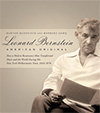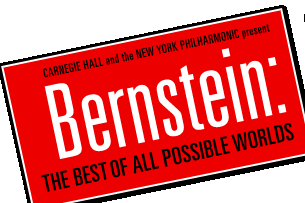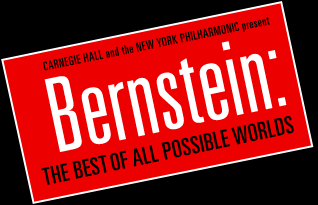
THE SOCIAL ACTIVIST
- Leonard Bernstein
- Stage & Film
- Concert Music
- The Conductor
- The Educator
- The Social Activist
- Bernstein’s New York
- Bernstein and Faith
- Bernstein at Carnegie Hall
- Bernstein and the New York Philharmonic
- Bernstein Memory Bank
- Bernstein Timeline
“This will be our reply to violence: to make music more intensely, more beautifully, more devotedly than ever before.”
Video
Leonard Bernstein and the New York Philharmonic greet Dmitri Shostakovich in Moscow, 1959.
From The New York Philharmonic in Moscow, 1959, courtesy of The New York Philharmonic Archives.
Related Video
 |
Focus On
Causes and Effecting Change
Leonard Bernstein’s impressive musical gifts can make it easy to overlook his lifelong and sometimes controversial commitment to promoting political change. This commitment was hardly separate from his musical endeavors—music for Bernstein was a means of creating mutual understanding and peace. The porous border between the musical and the political is a recurring theme in Bernstein’s life, and it surfaces as early as 1939, his last year at Harvard when he organized a defiant production of Marc Blitzstein’s radical and recently banned opera The Cradle Will Rock, which dramatized the struggle of workers to resist corruption and corporate greed. In the same year, he wrote a senior thesis titled …
From Leonard Bernstein: American Original
Paul Boyer on Leonard Bernstein’s Social Activism
Blame it on Tom Wolfe. For many Americans, Leonard Bernstein’s image as a social activist is indelibly associated with a 1970 gathering he and his wife hosted in their elegant Park Avenue apartment that included members of the radical Black Panther party. In a New York magazine article and subsequent book, Wolfe skewered the event as “radical chic”—the fatuous pursuit of radical groups by faddish celebrities desperate to keep themselves in the public eye.
Bernstein explained that the event had not been an endorsement of the Black Panthers, which espoused armed resistance and socialism, but a fundraiser for their legal defense in the face of FBI harassment. But Wolfe’s “radical chic” label stuck. In The New York Times obituary for Bernstein, in 1990, a brief paragraph on his social activism mainly rehashed the 1970 brouhaha while largely ignoring a lifetime of engagement with social issues, from racial justice and civil liberties to environmental protection and world peace.
Excerpted from Leonard Bernstein: American Original, by Burton Bernstein and Barbara B. Haws (HarperCollins, August 2008).
Listen
Excerpt from Bernstein’s Mass, “I Don’t Know”
Deutsches Symphonie-Orchester Berlin / Kent Nagano, Conductor. Harmonia Mundi.
Find this and more of Leonard Bernstein’s work at ArkivMusic.com ›
Support
Support Festivals at Carnegie Hall
Join Today! ![]()
Leonard Bernstein: American Original

By Burton Bernstein— former New Yorker writer and Leonard’s brother—and the New York Philharmonic’s historian, Barbara Haws.
Buy now ![]()
Related Events
© 2001–2008 Carnegie Hall Corporation
- Home
- |
- Multimedia
- |
- Press
- |
- Partners
- |
- Supporters






